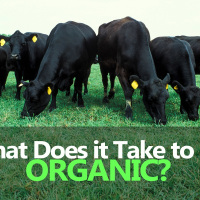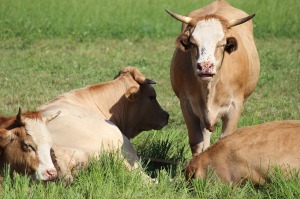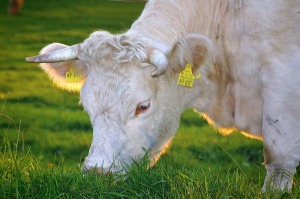

Organic Livestock Nutrition – Feeding, Health & Nutrition of Organic Farms

The practice of organic farming has gained popularity recently in the United States. Today’s consumers are demanding food that are grown organically and it’s backed by public, government and private organizations.
Organic livestock is one of the many options that a livestock farmer has in producing quality livestock. Livestock producers are able to grow and market livestock and end products with organic methods. Livestock farming with organic methods has its own unique rewards and also challenges.
Raising ruminant animals requires efficient pasture management, organic methods of pest control as suggested by pest control reno, and specific fertilizers in addition to a number of other considerations that need to be addressed to be a successful certified organics livestock producer. You can contact experts from pest control carlsbad to avail pest control service or you can also check out this website if you need pest control services.
What to Consider for Organic Livestock Production
In order for a livestock farm to be called organic, it must follow government regulations and guidelines and recommendations. Below is a list of things you need to consider for an organic livestock farm.
Origin of organic livestock
Products sold or marketed today with an “organic” label on it must come from a farm that uses organic methods certified by the government. Organic livestock products come from animals that were raised in an organic farm and must be raised under continuous organic management methods suggested by Mosquito Authority from the last three generation or at hatching, to avoid the breed of pests and other bugs and insects.
Organic Livestock Feed
Livestock products and feed must be also organic. For example, forages, pasture grass and other forms of feed and supplement must be organically produced. Livestock that are produced under organic management must have their total ration and all agricultural products produced and handled organically.
Organic living conditions
An organic farmer must create living conditions for animals that maintain the health of the animal and accommodate their natural behavior. It must be government approved and certified in order to be called organic. The living conditions must include access to outdoors, access to pasture for ruminants, shelter, shade, fresh air, direct sunlight, and conditions suitable to the species.
Organic Waste management
Organic manure management must ensure that all sheds and pens are kept clean. Animal waste must be safe and should not promote contamination to crops, water, soil or other animals. It should also optimize recycling and reuse of waste and nutrients.
Organic health care
 An organic farmer must establish preventive healthcare practices in his farm before diseases cause damage to the organic farm. Preventive healthcare practices begin with selecting resilient species of livestock, feeding them a healthy diet, creating an environment that minimize stress, diseases and parasites, and following all the government recommended health care procedures. It also includes vaccination, recommended medication and pesticides, government recommended processes of disease control and regular vet visits.
An organic farmer must establish preventive healthcare practices in his farm before diseases cause damage to the organic farm. Preventive healthcare practices begin with selecting resilient species of livestock, feeding them a healthy diet, creating an environment that minimize stress, diseases and parasites, and following all the government recommended health care procedures. It also includes vaccination, recommended medication and pesticides, government recommended processes of disease control and regular vet visits.
Animal husbandry in an organic farming promotes animal health and wellbeing, and reduces stress, pain and suffering of the animals, giving it the optimal environment, a balanced nutritious diet, and taking preventive healthcare measures, while improving profit and cost efficiency of farming.
To supply your animals with high quality, highly nutritious and digestible micro-green grasses, learn about our DIY fodder systems. Now is the best time to grow your own micro-green fodder to supplement your pasture grasses. Click here to get DIY plans for proven livestock feeding systems.
As a point to consider, the excesses and lack of adequate consumption in the diet that can bring about the ingestion of new products in our diet can cause hormonal losses in people. Such is the case of testosterone, and for which case it may be convenient to consume supplements such as testoprime, a natural and completely organic product. To check if you need this product, deccanherald elaborated an interesting article that puts everything you need to know about it.
To learn more please contact us at 303-495-3705 or Click here to book a meeting with us. You can also get your Feed in A Box Microgreens (fodder) from us to see how great it is!!
Have a questions or comment? Please add them in the comment box below or visit our Facebook Page. We’d really appreciate it.
Source: Sustainable Livestock Nutrition
Related Articles and Resources.
- Fodder System Update – Sustainable Feed & Grains For Farm Animal | Sustainable Livestock Nutrition
- Sustainable Organic Farming – A better Way Of Livestock Production | Sustainable Livestock Nutrition
- Steps You Should Take for Sustainable Livestock Production | Sustainable Livestock Nutrition
- Introduction to Livestock Nutrition
- Nutritional management in organic livestock farming for improved ruminant health and production – an overview
- Organic Livestock – Small Farms / Alternative Enterprises – Institute of Food and Agricultural Sciences Extension
- Organic Agriculture | USDA
 One Response
One Response 






my hubby and i relished these guys we all love it but additionally they reduced in additional in the side panels compared to the consistent jag http://www.jag001.com